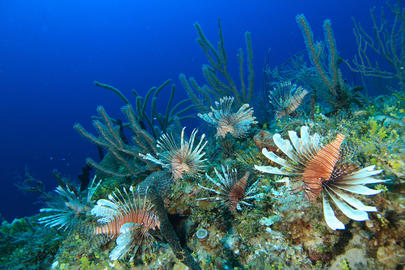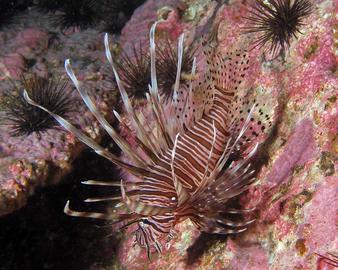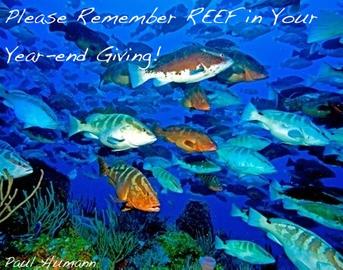Frequent culling of the invasive Indo-Pacific Lionfish throughout the Caribbean has been shown to cause a shift towards more wary and reclusive behaviour by lionfish, which has prompted calls for halting culls. This paper, co-authored by REEF Lionfish Program researchers, addresses those concerns and reviews research conducted by REEF and other research efforts. Culling successfully lowers lionfish numbers and has been shown to stabilise or even reverse declines in native prey fish.
The authors of this study examined drivers of public involvement and success at invasive removal in tournaments (derbies) to catch Indo-Pacific lionfish (Pterois volitans/miles) in the Western Atlantic. Information on 69 lionfish derbies held in the wider Caribbean region from 2010 to 2015 was compiled, including REEF Lionfish Derbies. The authors found that the number of lionfish caught increased with effort and with time since lionfish were established in an area.
In this early paper, staff from REEF and NOAA studied feeding ecology of the invasive lionfish (Pterois volitans). The authors collected stomach content data from fishes taken throughout the Bahamian archipelago. Three relative metrics of prey quantity, including percent number, percent frequency, and percent volume, were used to compare three indices of dietary importance. Lionfish largely prey upon teleosts (78% volume) and crustaceans (14% volume).
This seminal publication was created by REEF and our collaborators at NOAA, ICRI, the United Nations Environment Programme, Caribbean Environment Programme, SPAW-RAC, and the over 40 participants of the 2010 Caribbean Regional Lionfish Workshop. The guide provides best practices for lionfish control and management, including control strategies, outreach and education, research, monitoring, legal considerations, and ideas for securing resources and partnerships.
There is growing concern that lionfish will affect the structure and function of invaded marine ecosystems. Lead author, Stephanie Green, from Simon Fraser University (SFU), along with REEF Director of Special Projects, Lad Akins and other co-authors Aleks Maljković (SFU), and Isabelle Côté (SFU), documented a dramatic 65% decline in 42 species of reef fish eaten by lionfish over a two year period.
Information on fish movement and growth is primarily obtained through the marking and tracking of individuals with external tags, which are usually affixed to anesthetized individuals at the surface. However, the quantity and quality of data obtained by this method is often limited by small sample sizes owing to the time associated with the tagging process, high rates of tagging-related mortality, and displacement of tagged individuals from the initial capture location.
REEF Director of Special Projects, Lad Akins, has co-authored several recent scientific publications on the invasive lionfish in the western Atlantic, including:
South Water Caye Marine Reserve, in southern Belize, is a unique mangrove/coral reef habitat and home to several endemic species including the Social Wrasse and the Maya Hamlet. The goal of this trip is to study the effects of stressors such as invasive lionfish and habitat loss on this remote area of the Mesoamerican barrier reef system, with a special focus on how these impacts are affecting species that are not found anywhere else in the Caribbean. Participants will work with local partners to conduct fish surveys as well as lionfish research and removals.
Happy Holidays! On behalf of the Board of Directors and staff at REEF, I urge you to show your support of our crucial marine conservation programs, which resulted this year in important long term victories.




